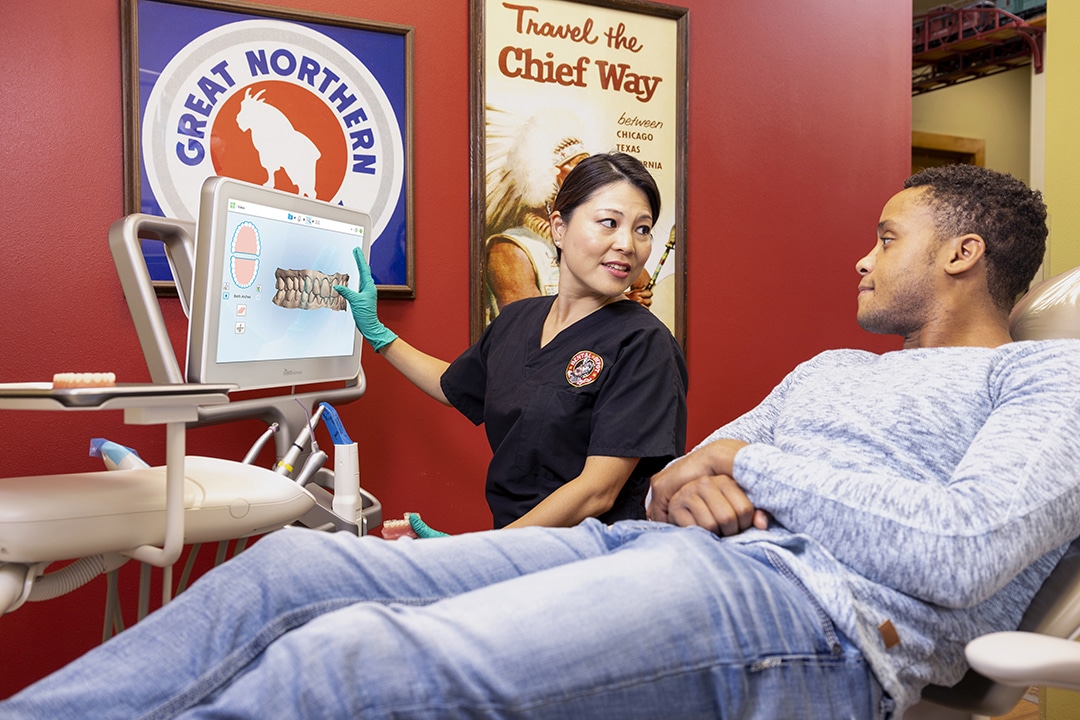Dental Depot DFW’s team of trained professionals includes dentists certified in Obstructive Sleep Airway (OSA) identification. Not only can our experts detect the signs and symptoms of sleep disorders—such as sleep apnea—but, in many cases, they can also prescribe and monitor the treatment necessary to correct it.
Don’t wait for better sleep or better health. Quality sleep is paramount for good health, and oral appliance therapy is covered by many insurance plans. If you are concerned that you or a loved one may be suffering from sleep apnea, contact one of our Dental Depot offices in Dallas, Lewisville, Aubrey, The Colony, McKinney, Arlington, and Highland Village to schedule an initial exam and consultation. To find the location nearest you, click the link below.

Sleep apnea—a disorder that causes pauses in and/or shallow breathing while sleeping—affects nearly 50 million Americans. Sleep apnea can be a symptom of a more serious issue or, if left untreated, can even lead to future health problems, including irregular heartbeat, high blood pressure, stroke, or chronic heart failure. It is characterized by excessive snoring, frequent awakenings during the night, and noticeable fatigue during the day.
The most common type of sleep apnea is obstructive sleep apnea, or OSA. OSA occurs when the throat muscles relax and temporarily collapse during sleep, blocking the airway and obstructing breathing. The throat muscles support various parts of your mouth and throat, including the uvula, the tonsils, the tongue, and the soft palate. When they collapse, breathing becomes shallow and inadequate and may even stop for anywhere from 10 seconds to a minute. This lowers the level of oxygen in the blood and increases the level of carbon dioxide.
The lowered levels of oxygen trigger the brain to wake you from sleep, and, in the case of OSA, is often so brief most people don’t remember it. This can happen over and over again from five to 30 times or more each hour, all night, disrupting your sleep and preventing your brain from reaching the deep, restorative stages of sleep.
Because sleep disorders are often related to irregularities in the throat, mouth, and nose, dentists are commonly the first medical professional to identify the signs and symptoms of sleep apnea. Many dentists are trained to notice, treat, and manage conditions like snoring and sleep apnea, and can do so during routine exams. A disproportionate jaw, redness in the throat, a tongue with scalloped edges, and signs of teeth grinding are all indications that you may be suffering from a sleep disorder.
Although many dentists are qualified to treat sleep disorders like OSA, not all of them are. Oral appliances should only be provided by dentists who are qualified in dental sleep treatments. These professionals have the additional training and skill to accurately assess your condition, prescribe appropriate treatment, and monitor it correctly.
While your dentist can identify warning signs and monitor treatment, only a certified sleep specialist can determine if you have a sleep disorder. You will undergo a complete sleep evaluation that may involve an overnight study or at-home sleep test to provide the information necessary to diagnose you and recommend treatment.
While most people associate sleep apnea treatment with a CPAP (continuous positive airway pressure) machine—which uses pressurized air to keep the airway open—not all types of sleep apnea require it. Since OSA is related to the position of the jaw and/or tongue while sleeping, it can often be treated with an oral appliance that is worn at night. Much like an athletic mouth guard or an orthodontic retainer, sleep apnea appliances are custom-fitted to your mouth and help correctly position the lower jaw. Moving the jaw slightly forward and preventing the collapse of your tongue and upper airway muscles keep your airways open so you can breathe better while you sleep.
